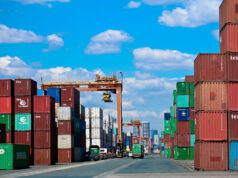PHL companies gauge coronavirus impact
THE country’s top companies are beginning to assess the impact of the coronavirus disease 2019 (COVID-19) outbreak on their businesses, warning of lower consumer demand and continued operational disruption in the coming weeks.
Malacañang on Monday said that President Rodrigo R. Duterte will impose “enhanced community quarantine” in the main island of Luzon, expanding the lockdown of Metro Manila which began a day earlier.
Diversified conglomerate San Miguel Corp. (SMC) told the stock exchange it is seeing lower demand for its food and beverage products from restaurants, bars, hotels and other public establishments amid the decline in tourism activities and ban on public gatherings.
“However, we expect that there will be a corresponding increase in in-house consumption of our food and beverage products,” SMC said.
Petron Corp., a unit of SMC, is similarly expecting a drop in demand for gasoline, diesel and aviation fuel, amid a decrease in the use of public and private transportation. This will also mean lower volume of vehicles on SMC’s tollroads.
“The company does not expect the present situation will cause delays in the delivery of the supply of raw materials for use in our products. Nor do we expect delays in the progress of the construction of our infrastructure projects, unless there is a restriction in the free movement of workers and the delivery of supplies and raw materials,” SMC, whose infrastructure projects include the Metro Rail Transit Line 7 and the Skyway Stage 3, said.
Ayala Corp. (AC) said the increasing number of COVID-19 cases has “raised concerns on its effect on the Philippine economy, which can subsequently impact the outlook for Ayala’s various business interests.”
With the coronavirus outbreak, Ayala Land, Inc. (ALI) said its malls have seen lower foot traffic, while hotels and resorts recorded a decline in bookings. It likewise expects lower sales from residential properties as buyers set aside big purchases to prioritize personal health.
Metro Pacific Investments Corp. (MPIC) said Manila Electric Co. sees strong demand in the residential segment as more people work from home, although there is a drop in demand from industrial and commercial sectors.
Its unit Metro Pacific Tollways Corp. expects a “substantial traffic decline” on the North Luzon Expressway and the Cavite Expressway due to the Metro Manila quarantine. Light Rail Manila Corp. said it has seen a 19% decline in average daily ridership at the Light Rail Transit Line 1 due to school closures and increase number of people working from home.
However, MPIC said the COVID-19 outbreak may not have any substantial impact on its water and logistics segments.
Sy-led SM Investments Corp. (SMIC) is expecting to take a hit from the outbreak, although it is assessing the impact of the closure of malls which began on Monday.
“In Retail, it is reasonable to expect a slowing of growth in the non-essential categories whilst the Food Group is business as usual including planned expansion. Quarter 1 is typically a lean quarter, and the full impact of the COVID-19 crisis remains to be seen as we progress through the year,” SMIC said.
SMIC said the impact of the coronavirus outbreak has been “limited” for banks, as BDO Unibank, Inc. recorded normal loan and deposit growth.
“However, the longer-term impact is uncertain and will depend on the COVID-19’s duration, depth and scale. With its robust business franchise and solid balance sheet, we believe it will remain resilient in the face of this current challenge,” SMIC said.
Lucio C. Tan’s LT Group, Inc. said Asia Brewery, Inc. is observing a spike in demand for its bottled water products, as consumers stockpile essential goods. Tanduay Distillers, Inc. said the COVID-19 outbreak may reduce demand for liquor, while the community quarantine may cut consumers’ spending power as workers stay at home.
“Even before the COVID-19 outbreak, demand for liquor products have already been significantly affected by higher selling prices resulting from the high increase in excise taxes,” Tanduay said.
Jollibee Foods Corp. (JFC), which operates restaurants locally and overseas such as China and the US, said the COVID-19 impact on operations varies in different countries.
“Generally, as of the week of March 9, 2020 — the adverse impact on the restaurant operations was severe in China (including Hong Kong and Macau), less severe in Vietnam and moderate in the Philippines and the United States,” JFC said.
JFC flagged the possibility of raw material shortage due to the lockdown, and the delivery service is helping keep businesses afloat.
Gotianun-led Filinvest Development Corp. and property unit Filinvest Land, Inc. (FLI) are also seeing a drop in sales, particularly in its hospitality and real estate segments. FLI said it is preparing for delayed projects, and in the worst case scenario, canceled and terminated lease deals.
STILL ASSESSING RISKS
The Gokongwei’s JG Summit Holdings, Inc. said it is still assessing the risks although restrictions both locally and abroad “have the potential to change the risk dynamics of the businesses of (its) subsidiaries.”
Ty-led GT Capital Holdings, Inc. said the impact of the virus is “yet to be fully ascertained due to the yet unfolding events of the situation.” All its business units remain operational for now.
Andrew Tan’s Alliance Global Group, Inc. likewise did not specify on the effects of the virus to its various business segments, as it said it is still assessing the material impact of the lower foot traffic in retail and restaurant sales, and overall, to the company’s financial performance.
The wave of announcements yesterday from listed companies led to a 7.92% drop in the Philippine Stock Exchange index to 5,335.37. Trading hours were also cut to 9 a.m. to 1 p.m. until April 14.
Philstocks Financial, Inc. Research Associate Piper Chaucer E. Tan said the community quarantine in Metro Manila is heavily disrupting work schedules and public transport, “putting havoc…on almost all of the commerce of man.” “I think this is a no brainer that this will affect the economy, but the question right now is by what scale and how much?” he said. — Denise A. Valdez



